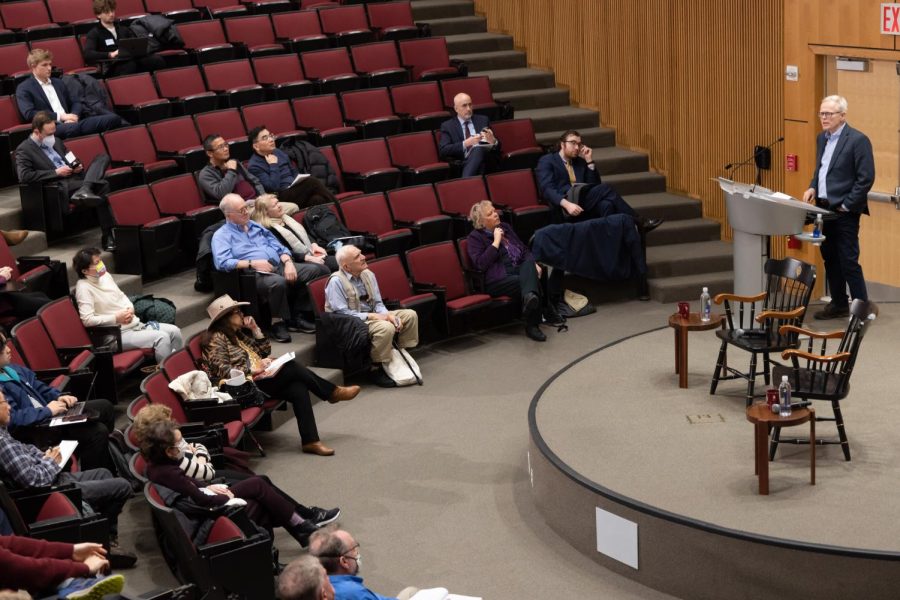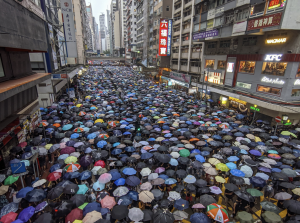Fordham Hosts Civil Religion Lecture With Pulitzer Prize-Winning Author Ian Johnson
The talk featured discussions about government control and the increased combination of patriotism and local religion across China
The event was hosted by Fordham’s Center on Religion and Culture (CRC) and the U.S.-China Catholic Association.
February 10, 2023
Fordham’s Center on Religion and Culture (CRC) and the U.S.-China Catholic Association co-hosted a lecture on Jan. 25 with Pulitzer Prize-winning author Ian Johnson to discuss the religious and political state of China. The lecture took place in the McNally Amphitheatre and focused on the Chinese Communist Party (CCP) vying for international prominence. The event was part of CRC’s goal to hold continued events regarding religious education throughout the 2022-23 academic year.
Johnson began the talk by speaking about the meteoric rise of religion in the Chinese state since the CCP gained control in the late 1900s. He also further explained how religion is tied to China’s early economic growth and prosperity along with a diverse group of practitioners from all backgrounds.
“It wasn’t just old people that went to temples and mosques. It was people from all walks of life and different age groups,” Johnson said. “This was a reflection on the economic-focused vision of society, which wasn’t enough for humans in general.”
“China’s approach toward religion can be seen as an analogy to the modernization of the Western world.” Pulitzer Prize-winning author Ian Johnson
Johnson then transitioned to issues regarding the rise of religious practice and further discussed how the CCP found certain religious groups difficult to control. He noted examples of the CCP’s attempt to command religious groups, such as the underground Protestant churches in remote regions of China and the practice of Islam in secluded parts of the nation, like the Uyghur detention camps in Xinjiang.
Throughout the talk, Johnson focused on the five major religions of the nation — Daoism, Buddhism, Islam, Protestantism and Catholicism — as well as their applications to the daily life of the Chinese people.
“China’s approach toward religion can be seen as an analogy to the modernization of the Western world,” he said. “Instead of trying to force religion, they tried to let things play out a bit, not expecting much participation. Instead, there was a revival of religion.”
He further narrowed down his approach to China’s religious relationships by separating the five major religions into two main camps: indigenous and foreign religions. While systems such as Daoism and Buddhism were more native to the Chinese homeland, Islam, Protestantism and Catholicism were deemed foreign and seen as results of European colonialism.
Toward the end of his speech, Johnson explained that the combination of religion and government produced a form of civil religion, which essentially was a state-sponsored religion being used as a vehicle for patriotism and expanded CCP control.
Johnson added that there have been instances of forced cultural assimilation and genocide with the aim to “push down the presence of Islam in people’s lives.” According to Johnson, the CCP came to the conclusion that Islam and Christianity are a greater threat to its control over people, leading to the development of reeducation camps as a means of grouping and controlling ethnic Uyghur Muslims in the Chinese Xinjiang province.
Toward the end of his speech, Johnson explained that the combination of religion and government produced a form of civil religion, which essentially was a state-sponsored religion being used as a vehicle for patriotism and expanded CCP control.
“The government used religious images and texts to legitimize its rule,” he said. “There were local endorsements of religion from Xi Jinping himself, and there was a development of civil religion even found in architecture.”
When Johnson concluded his discussion, the lecture then transitioned to a three-question response section led by Chairetto Yan, a professor at Pontifical Gregorian University in Italy whose research focuses on China and its interactions with religion.
One participant asked whether the CCP’s embracement of Buddhism is an indicator of their skepticism toward Christianity and Islam. Yan began by explaining religious biases and provided the example of associating Catholicism with Western imperialism and Islam with extremism.
“Since the late 1900s, Catholicism has been associated with Western imperialism,” he said. “Many see these foreign religions as tools for Western political influence and in particular violence and extremism with association to Islam.”
Another attendee spoke about the stagnant number of Catholics in China, in response to which Yan noted that there is a growing polarization between official and underground Catholic churches in China. Yan added that the youth populations are serving as the main driving force behind this split. He also attributed the Catholic population’s general decline to fractures and split objectives within the Catholic Church.
The last question of the event addressed whether the state supports some traditional values and certain religious practices within their “civil religion” approach. Believing that this was the case, Yan noted that “the Communist ideology is not enough of a belief system to hold people together.” He added that additional religious and belief systems were needed to legitimize the rule of the CCP.
“I think it’s interesting to see the bigger picture behind China’s relationship to religion, especially in relation to how the people live their daily lives.” Josue Zhang, Fordham College at Rose Hill ’25
Johnson then concluded the talk, and attendees were able to ask more questions, some of which included the potential relationship of China’s civil religion to COVID-19 and communication between Chinese Catholics and the Vatican.
“Overall, the melding of religion and state is something we’re going to see more of in China,” Johnson said. “This puts religion back in the center of Chinese culture and politics. It’s fundamental to how the state sees itself as the so-called defender of Chinese culture and faith.”
“I think it’s interesting to see the bigger picture behind China’s relationship to religion, especially in relation to how the people live their daily lives,” Josue Zhang, Fordham College at Rose Hill ’25 and an international student from China, said after attending the event. “As a former resident of China for most of my life and Buddhist practitioner, I never really considered the impact that the government had on our religion as a whole.”
The event concluded with a wine-and-cheese reception in the Ram Café atrium, along with some time allocated for conversations between event participants, members of the CRC and the presenters.













